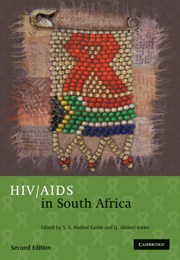Book contents
- Frontmatter
- Contents
- List of Contributors
- Foreword: Peter Piot
- Foreword: Nelson R Mandela
- Acknowledgements
- Section 1 Birth of a rapidly growing epidemic
- Section 2 The virus, the human host and their interactions
- Section 3 HIV risk factors and prevention strategiess
- Section 4 Focal groups for understanding the HIV epidemic
- Section 5 The impact of AIDS
- Section 6 Treating HIV
- 27 Tuberculosis and HIV
- 28 Prevention of opportunistic infections in adults
- 29 Nutritional prophylaxis
- 30 Challenges in managing AIDS in South Africa
- 31 Antiretroviral therapy
- 32 The challenges of implementing antiretroviral treatment in South Africa
- Section 7 What does the future hold?
- Index
30 - Challenges in managing AIDS in South Africa
Published online by Cambridge University Press: 07 September 2011
- Frontmatter
- Contents
- List of Contributors
- Foreword: Peter Piot
- Foreword: Nelson R Mandela
- Acknowledgements
- Section 1 Birth of a rapidly growing epidemic
- Section 2 The virus, the human host and their interactions
- Section 3 HIV risk factors and prevention strategiess
- Section 4 Focal groups for understanding the HIV epidemic
- Section 5 The impact of AIDS
- Section 6 Treating HIV
- 27 Tuberculosis and HIV
- 28 Prevention of opportunistic infections in adults
- 29 Nutritional prophylaxis
- 30 Challenges in managing AIDS in South Africa
- 31 Antiretroviral therapy
- 32 The challenges of implementing antiretroviral treatment in South Africa
- Section 7 What does the future hold?
- Index
Summary
SUITABLE INFRASTRUCTURE IS NEEDED to manage HIV-infected individuals at primary care level, but funding is not readily available and qualified health care personnel are in short supply.
Private health-care attracts most health care funding, but is accessed by less than 20% of South Africans. The standard of hiv care in the private sector is equivalent to that of the developed world. The National Tuberculosis Control Programme's dots infrastructure may be a useful starting point for the development of a sustainable hiv service. Lessons learnt through the dots programme are relevant to hiv services.
Effective use of antiretroviral therapy requires meticulous adherence. Poverty, alternative disease constructs, stigma, gender and unpredictable drug supply are important factors influencing adherence. However, small studies in impoverished areas of South Africa have shown that excellent results can be achieved. Extensive community involvement and recruitment of lay counsellors is essential. The management of tb and fungal infections in Africa is challenging because of limited facilities. Chronic diarrhoea and hiv-associated skin problems can be refractory to available treatments, and antibiotic resistance can develop as a result of the widespread and repeated use of antibiotics for serious bacterial infections.
Many hiv-infected individuals in South Africa will be unable to access antiretrovirals, and need palliative care, which can be therapeutically challenging and emotionally demanding. This needs to be acknowledged and proactively addressed.
South Africa is undergoing a period of profound socioeconomic development, and the hiv epidemic presents the medical system with extraordinary health care challenges.
- Type
- Chapter
- Information
- HIV/AIDS in South Africa , pp. 503 - 528Publisher: Cambridge University PressPrint publication year: 2010



